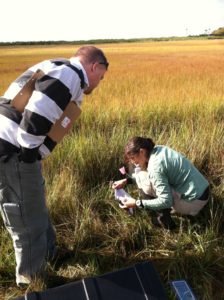NEIWPCC provides staff members who work directly with state agencies.
We furnish the specific skills and expertise that the states require to address their water-related priorities. These staff members typically work at state offices with state employees.
Maine
NEIWPCC employees work within Maine’s Department of Health and Human Service’s Drinking Water Program to implement drinking-water programs and projects. They support permitting and compliance efforts for public water systems and subsurface wastewater disposal systems. Additionally, these staff members track the use of Drinking Water State Revolving Fund monies and provide technical support for financial and data management associated with drinking water projects.
New York State
NEIWPCC employs multiple professionals who work within the New York State Department of Environmental Conservation (NYSDEC). Roles include assisting with the Drinking Water Source Protection Program (DWSP2), reducing agricultural runoff to the Lake Champlain basin, providing community outreach about aquatic invasive species and supporting Lake Champlain Basin Program initiatives. Staff are also involved with the Stream Monitoring and Assessment Program (SMAS) and the Lake Monitoring and Assessment Program (LMAS), contributing to ongoing water quality programs. Additionally, some staff are responsible for writing and reviewing permits as part of the State Pollutant Discharge Elimination System (SPDES) Permit Program.
Numerous staff also work with the New York State Department of Health (NYSDOH) on DWSP2 and Source Water Assessment and Protection plans. This includes conducting investigations on source water assessment and protection, water storage, treatment and distribution, wastewater treatment and discharge, point source and nonpoint source pollution, permitting, and other compliance and regulatory issues.
Additionally, NEIWPCC staff assist the New York City Department of Environmental Protection (NYC DEP) with the management and replacement of certain wastewater treatment infrastructure located within the City’s water supply watershed.
Green Infrastructure
NEIWPCC staff members work with NYSDEC to oversee progress toward compliance with the New York City Combined Sewer Overflow Consent Order, which requires construction of grey and green infrastructure projects valued at $3-4 billion. This includes reviewing long-term control plans for all CSO-impacted water bodies in New York City. The staff also monitor progress toward compliance with the 2006 Long Island Sound Biological Nutrient Removal Consent Judgment.
Hudson River Estuary Program

NEIWPCC staff members work within the Hudson River Estuary Program, in collaboration with NYSDEC and Cornell’s Water Resources Institute. Staff work to provide technical assistance and grants to river communities, educational programs to students and the public, and conduct habitat research in support of a healthy watershed.
Hudson River National Estuarine Research Reserve
Here, staff perform a variety of roles to support the goals of the Research Reserve, including science education, educator training and research and monitoring.
Long Island Sound
NEIWPCC staff works on the Long Island Nitrogen Action Plan (LINAP) at NYSDEC’s regional office at SUNY Stony Brook. Here, they support state and regional agency professionals in reducing the level of nitrogen in surface and ground waters around Long Island Sound.
NEIWPCC staff at the Long Island Sound Partnership support the work of this National Estuary Program in New York and Connecticut.
Rhode Island
Our staff at the Rhode Island Department of Environmental Management (RI DEM) plays a vital role with the agency’s surface water monitoring and assessment programs. Activities include biological monitoring, invasive species detection and water quality monitoring.
Staff also serve with the Rhode Island Department of Health, supporting the Center for Drinking Water Quality with the Lead Testing in Schools and Childcares Program.
NEIWPCC staff also work in the RI DEM Underground Storage Tank program, working to protect human health and the environment from leaking underground storage tanks.
Vermont
We provide an Environmental Analyst, based at the Vermont Department of Environmental Conservation in Montpelier, to assist with monitoring Lake Champlain and its tributaries, collecting and analyzing aquatic samples to determine water quality, and preparing comprehensive water quality study reports.
